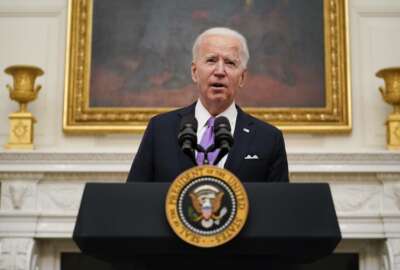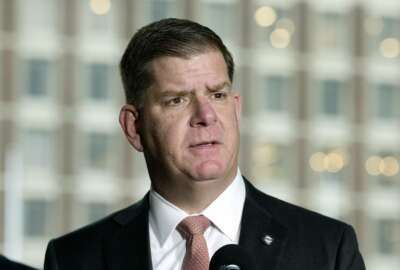
Budget considerations for Biden administration
To get anything done, President Biden's appointees will need to understand something arcane, mainly the federal budget process.
Best listening experience is on Chrome, Firefox or Safari. Subscribe to Federal Drive’s daily audio interviews on Apple Podcasts or PodcastOne.
As they settle in throughout the government, the Biden administration appointees come with ambitious agendas like all of their predecessors. To get anything done, though they’ll need to understand something arcane, mainly the federal budget process. For more, Federal Drive with Tom Temin spoke with Grant Thornton Managing Director and former federal CFO himself, Doug Criscitello.
Interview transcript:
Tom Temin: My first question to him was, how crucial is it that one of the first things high level appointees do is get into those books and get to know the CFO?
Doug Criscitello: Well, it’s critically important. I mean, you know, the old saying, “You get what you pay for” is not only true for government, but it’s what drives everything, right? The budget is developed each year to reflect the priorities of both the Congress and the executive branch. So the new Biden team coming in, they’re going to have to hit the ground running when it comes to understanding current year budget, right, we’re about we’re halfway through the current year. Next year, you know, not far away. And they’ll need to be thinking in terms of what do they need in terms of next year budget, and then looking to the year beyond that, you know, that’s actually the 2023 budget. And that will be the first opportunity for the incoming team to sort of take a step back and assess exactly what they want to do in terms of, you know, a full blown submission of the president’s budget to the Congress at that point.
Tom Temin: Now, the 2022 requests are in and in theory, they are going to be debated and talked about and marked up in Congress. But is there any opportunity to change the course of the 2022 fiscal year budget at this point, starting in, you know, January?
Doug Criscitello: Yeah, I mean, that’s typically what occurs. An incoming administration, the new administration will submit a streamlined budget for the coming fiscal year. And with Biden, given what we’ve heard about, and expectation for an additional economic stimulus, they’re going to propose to revise the ’21 budget as well. So we’ll see a revision to the current year budget. And then there will be a budget development exercise across government. Typically, it goes up to the Hill around March, April. So that will quickly occur. So agencies will sort of be on alert to help the Office of Management and Budget develop, really, it’ll be a streamlined budget that will go up for 2022. You know, as I said, that will probably go up in two or three months.
Tom Temin: And beyond the budget process, the processes of federal finance itself, I would think would be something that any program manager appointee would need to understand. So they know what is available to them, what they can legally do, and how much is in all the different accounts that they can bring to bear on a situation.
Doug Criscitello: Right. I mean, that’s critically important. So when new folks come in, they need to understand that they’re jumping on board a train that’s already moving down the track, right? The current year, funding is in place. Programs have been authorized and funded. So the new team needs to come on board, and, you know, understand that it’s their duty to operate those programs to guide those programs. Meanwhile, you know, they are thinking a strategic plan to realize the policy priorities of the new administration. So there’s multiple balls in the air really. So you know, most importantly, I think, is to hit the ground and understand that there are existing programs in place which you’re responsible for.
Tom Temin: Got it. So then basically, really, the CFO should be the first stop for any new appointee to understand the agency at all. I’m talking to a former CFO but, true?
Doug Criscitello: Yeah, you got a captive audience here. Yeah, it’s true on many different levels. I think as a senior leadership team of an agency comes in, and they consider what they want to accomplish in the four or eight years that they’re there. Obviously, the CFO needs to be a strategic advisor on that. But there are these near term issues that crop up and some of them are fairly mundane, right, about furnishing an office or do you travel first class or coach when you’re flying. Little things like that they can become many scandals in an agency if the leadership team isn’t working closely with the CFO to understand sort of the arcane rules about how federal monies can be expended.
Tom Temin: We’re speaking with Doug Criscitello, former federal chief financial officer, now Managing Director for the public sector at Grant Thornton. And that gets to another question I had – people coming from academic or corporate types of environments may have different rules than is common in federal. And my question is, suppose it’s your first day or first week as an appointee over a program and you want to send out for bagels for everyone. Do federal offices have like petty cash for things like bagels? Or is that pretty much out?
Doug Criscitello: Yeah, it very much is outlawed. And that’s a great example of what we were talking about. So you know, you could do something very innocently, it just becomes a huge headache for the agency. So, you know, day one hour one, the CFO needs to be a full – the CFO or budget director, I mean, either of those – agencies aren’t going to have full CFOs in place immediately, because the large agencies require Senate confirmation of those positions. But you will have a senior career civil servant responsible for budget on your team. And it’s incredibly important that that person be pulled in to make sure that everything that is done in those initial days is compliant with all of the various regulations of governance, particularly those around your Appropriations Act and the Antideficiency Act. You don’t want to run afoul of any of those.
Tom Temin: Sure, I said run to the CFO first, but really, to the CFO staff. In fact, the new CFO should run to the CFO staff to get the lay of the land.
Doug Criscitello: Oh, yeah, it’s just a huge repository of knowledge among the career civil servants that are manning the offices of CFOs across government. And they really, I’ve had quite a bit of experience working with OCFOs from across the government, and they really are true stewards of taxpayer dollars, just a terrific resource. And those folks, you know, I would also sort of counsel incoming political officials to understand that part of that role and being a budget officer or a staffer, and an OCFO is to speak truth to power, and to not be afraid to say no. That is just so important. And it’s the one office where leadership will occasionally say no. If the statutory authority is not there to enable certain types of spending, budget officer will say no. So, you know, you take some lumps from doing that. But it’s part of the job.
Tom Temin: And if the Biden administration gets what it wants immediately out of Congress, which would be another nearly $2 trillion spending bill for COVID, and a whole bunch of other things, what effect does that have? How soon does the money actually get into the coffers? And how does an agency deal with that giant payload of money that might come its way?
Doug Criscitello: Yeah, it really is a huge challenge. I know, over the past year, the Small Business Administration – an agency where I served as CFO – has really been under pressure to get money on the street through both its Paycheck Protection Program, and it has an economic injury disaster loan program. When all is said and done, they will have put about $1 trillion on the street and a calendar year. So yeah, that’s pretty – getting money out quickly is a huge challenge. And not surprisingly, right, we see instances of waste, fraud and abuse. So it’s a delicate balancing act. I know, another agency where I served as the CFO, Department of Housing and Urban Development, I was there in the aftermath of the 2008 financial crisis and administering the Recovery Act and HUD received quite a bit of money through the Recovery Act. It was challenging too and our mandate within the CFO was to get the money out quickly. And that’s a real challenge for CFOs to meet that mandate, yet still comply with all of the internal controls that are in place for a very good reason, right? To ensure that taxpayer dollars are protected and not squandered.
Tom Temin: Doug Criscitello is former chief financial officer at the Small Business Administration and also Housing and Urban Development. He’s now managing director for the public sector at Grant Thornton. We’ll post this interview at FederalNewsNetwork.com/FederalDrive. Hear the Federal Drive on demand. Subscribe at Apple Podcasts or wherever you get your shows.
Copyright © 2025 Federal News Network. All rights reserved. This website is not intended for users located within the European Economic Area.
Tom Temin is host of the Federal Drive and has been providing insight on federal technology and management issues for more than 30 years.
Follow @tteminWFED





